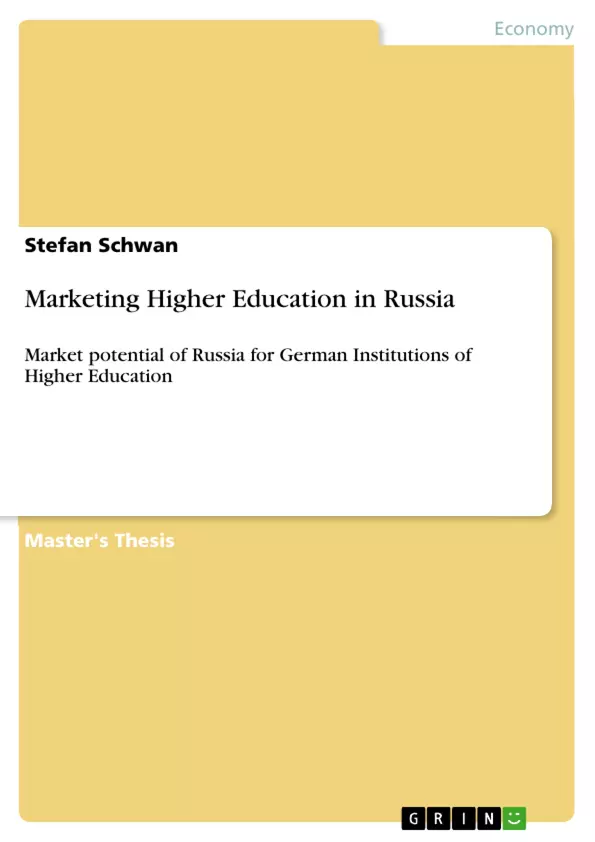The Paper comprises of four major parts. In the first part (situation analysis) the current economic situation and general environmental determinants relevant for marketing Higher Education in Russia will be sketched mainly based on desk research. The second part (Russian education system and environment) focuses on the Russian HE system. The next part (Consumer Perspective) has a look at the future clients analysing consumer habits towards HE, financial spending on education etc. using survey data of THE PUBLIC OPINION FOUNDATION. The following part (Industry perspective) is assessing international mobility and the present marketing activities of the German Academic Exchange Service (DAAD) as one of the major catalysts of German HE marketing. Apart from desk research this part is using the above named survey among a target focus group in Moscow. Using the same survey in the part “other players”, the market position of German HE marketing will be analysed to compare the German market position with other HE systems targeting the Russian market.
Inhaltsverzeichnis (Table of Contents)
- 1. Introduction
- 1.1 General Background
- 1.2 Objective and methodology
- 1.3 Structure
- 2. Situation analysis
- 2.1 Geographic environment
- 2.2 Demographic development
- 2.3 Economic Development
- 2.4 Regional Development and Investment climate
- 2.5 Culture and Language
- 2.6 Summary – Key points
- 3. The Russian Education System
- 3.1 Educational background
- 3.2 Institutions of HE
- 3.3 Workforce in HE
- 3.4 Types of Study
- 3.5 Grades and diploma
- 3.6 State education expenditures
- 3.7 Private sector HE
- 3.8 Summary - Key points
- 4. Industry surrounding and limiting factors
- 4.1 Household spending on HE
- 4.2 Access to HE, tuition fees and grants
- 4.3 Most demanded Faculties by the labour market
- 4.4 Summary - Key points
- 5. Consumer perspective
- 5.1 Consumer incomes and spending
- 5.2 General Consumer Attitudes towards HE
- 5.3 Consumer attitudes towards Russian HE
- 5.4 Consumer attitudes towards spending on HE
- 5.5 Education preferences and consumer perceptions on professions
- 5.6 Consumer attitudes towards Germany and German HE
- 5.7 Summary – Key Points
- 6. Industry perspective – the German view
- 6.1 Student's enrolment and mobility
- 6.2 Preferred destinations
- 6.3 Attitudes towards German HE
- 6.4 Summary – Key Points
- 7. Other players in the Market
- 8. Market access and barriers
- 9. Future perspectives
- 9.1 Future growth potential of HE in Russia
- 9.2 Future growth potential of HE-exchange with Russia and growth in mobility to Germany
- 9.3 Recommended response of German HEIs
Zielsetzung und Themenschwerpunkte (Objectives and Key Themes)
This study analyzes the market potential in Russia for German higher education institutions. It examines the Russian higher education system, the relevant economic and social factors influencing demand, and the perspectives of both Russian consumers and German institutions. The goal is to provide a comprehensive assessment of opportunities and challenges for German universities seeking to expand their presence in the Russian market.
- The Russian higher education system and its characteristics.
- Economic and demographic factors affecting demand for higher education in Russia.
- Consumer attitudes and preferences regarding higher education in Russia and Germany.
- The perspectives of German higher education institutions on the Russian market.
- Market access and barriers for German institutions in Russia.
Zusammenfassung der Kapitel (Chapter Summaries)
Chapter 1: Introduction provides background on the evolving internationalization strategies of German higher education, shifting from development aid to market-driven approaches. Chapter 2: Situation analysis offers an overview of the geographic, demographic, economic, cultural, and linguistic context in Russia. Chapter 3: The Russian Education System details the structure, institutions, funding, and workforce of the Russian higher education system. Chapter 4: Industry surrounding and limiting factors discusses factors impacting access to higher education in Russia such as household spending and tuition fees. Chapter 5: Consumer perspective explores consumer attitudes, preferences, and perceptions regarding higher education, including those toward German institutions. Chapter 6: Industry perspective – the German view presents the German viewpoint on student enrollment and mobility to and from Russia.
Schlüsselwörter (Keywords)
Higher education, Russia, Germany, market analysis, internationalization, consumer behavior, economic development, education system, market access, student mobility.
Frequently Asked Questions
What is the current state of the Russian Higher Education system?
The Russian HE system is undergoing transformation, with a mix of state and private institutions. It is characterized by specific types of study, grades, and a workforce that is adapting to global standards.
How do Russian consumers perceive German Higher Education?
Research indicates positive attitudes towards German education, often associated with quality and career prospects. However, financial constraints and language barriers remain significant factors for Russian students.
What are the main barriers for German universities in the Russian market?
Barriers include market access regulations, economic fluctuations in Russia, and competition from other international education providers targeting Russian students.
What role does the DAAD play in Russian HE marketing?
The German Academic Exchange Service (DAAD) acts as a major catalyst, promoting German universities and managing mobility programs between the two countries.
Which faculties are most in demand in the Russian labor market?
The study identifies faculties and professions that Russian households prefer, reflecting the current demands of the Russian industry and economic development.
- Quote paper
- MBA Stefan Schwan (Author), 2005, Marketing Higher Education in Russia, Munich, GRIN Verlag, https://www.grin.com/document/119246



